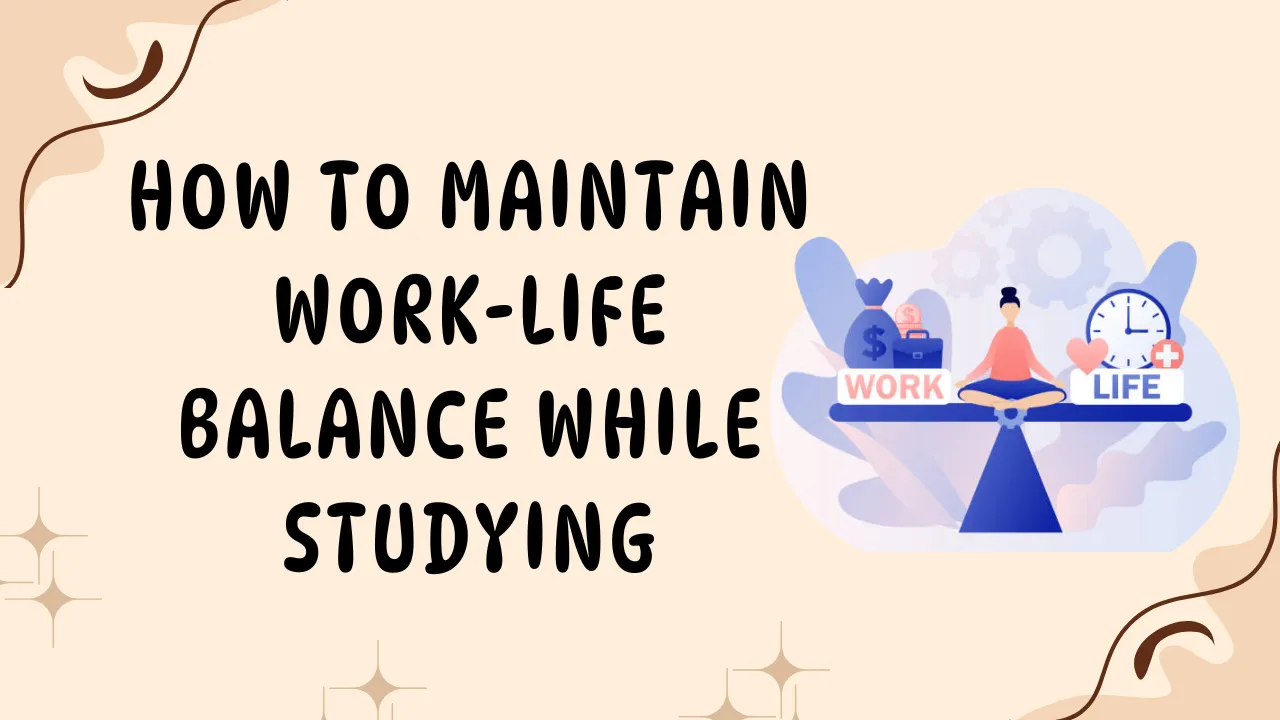Maintain work-life balance while studying: Maintain work-life balance while studying is one of the most important habits every student should build. Whether you’re in high school, college, or taking online courses, it’s easy to feel overwhelmed. Between attending classes, completing assignments, and managing personal responsibilities, many students find it hard to keep everything in check.
In this article, we will discuss how to maintain work-life balance while studying through practical steps and time-saving habits. You’ll learn how to manage your day, avoid stress, and stay productive without giving up your social life or well-being. With the right strategies, you can succeed in both your academic and personal life.
Set Realistic Goals
The first step to maintain work-life balance while studying is to set clear and achievable goals. Trying to do too much at once can lead to stress and burnout. Start by listing your daily or weekly goals and focus on completing them one at a time.
Break down large tasks into smaller steps. This makes them less overwhelming and easier to manage. Achieving small goals regularly will keep you motivated and help maintain balance between your work and personal life.
Create a Daily Schedule
Having a daily schedule is one of the best ways to manage time. Plan your day with fixed study hours, breaks, meals, and personal time. When you follow a routine, it becomes easier to maintain work-life balance while studying.
Use tools like Google Calendar, planners, or mobile apps to organize your day. Always include time for self-care, sleep, and relaxation. A balanced schedule ensures you don’t focus only on studies while ignoring your health or happiness.
Avoid Overloading Yourself
Taking on too many responsibilities can disturb your balance. Many students try to handle multiple classes, part-time jobs, and social commitments at once, which leads to exhaustion. To maintain work-life balance while studying, you need to know your limits.
Learn to say no when needed. Don’t feel guilty for turning down extra work or skipping a social event if you’re tired. Your well-being should always come first.
Make Time for Relaxation
Rest is just as important as work. If you’re always studying without breaks, you’re more likely to feel tired and less focused. Taking time to relax helps refresh your mind and improves your productivity.
You can watch a movie, read a book, go for a walk, or just take a nap. These short breaks will help you reset and return to your tasks with better energy and focus.
Stay Active and Healthy
Physical health has a big impact on mental health and focus. Regular exercise, even if it’s just 20 minutes a day, can help reduce stress. Eat healthy meals and drink enough water throughout the day.
To maintain work-life balance while studying, make time for workouts, sleep at least 7-8 hours a night, and avoid junk food. A healthy body supports a strong and alert mind.
Practice Time Blocking
Time blocking means assigning specific time periods to tasks. For example, you can decide to study from 10 AM to 12 PM and go out with friends from 5 PM to 6 PM. This helps you stay focused and avoid wasting time.
It’s a smart way to maintain work-life balance while studying because it separates your work from your personal activities. This helps you enjoy your breaks more and concentrate better when it’s time to study.
Use Technology Wisely
Technology can help or hurt your balance. Mobile phones, social media, and games can distract you from your goals. To avoid this, use apps that block distractions or set screen time limits during study hours.
At the same time, use useful tools like study apps, planners, and productivity trackers. These can help you stay organized and reduce stress.
Tips to Stay Balanced (List)
Here are a few tips to help you stay balanced:
- Plan your day with fixed study and rest times
- Don’t say yes to every task or event
- Stay active with short exercises
- Take short breaks every 1–2 hours of study
- Avoid screens during bedtime for better sleep
Keep a Social Life (List)
Maintaining friendships is important. Here’s how to enjoy a social life without affecting your studies:
- Set a time for social media or chats
- Join group studies that mix fun and learning
- Go out with friends only after completing major tasks
- Talk to loved ones if you feel overwhelmed
- Keep weekends flexible for rest or social events
Don’t Compare Yourself to Others
One key to balance is not comparing your routine to others. Some students may study for hours, while others need more breaks. Everyone works differently. Focus on your own goals, not someone else’s path.
To maintain work-life balance while studying, trust your own process. Success comes from smart planning, not just long hours.
Seek Support When Needed
If you feel stressed or stuck, don’t be afraid to ask for help. Talk to teachers, friends, or a family member. Many schools also offer counselling or support services for students.
Getting help can make it easier to manage your time and emotions. Remember, it’s okay to feel overwhelmed, but you don’t have to go through it alone.
FAQs
How many hours should I study each day?
It depends on your course and energy level, but 2–4 focused hours daily is usually enough for most students.
Can I still have fun while maintaining balance?
Yes! Balance means making time for both study and fun. Enjoy breaks and social time without guilt.
What if I have too many things to do at once?
Prioritize your tasks and remove anything unnecessary. Focus on what’s important now, and do the rest later.
How does sleep help with balance?
Good sleep keeps your mind sharp and reduces stress. It’s essential for learning and staying healthy.
Is multitasking good for studying?
No. It’s better to focus on one task at a time. This improves your understanding and reduces mistakes.
Final Thought
Learning how to maintain work-life balance while studying is not hard — it just takes a little planning and self-awareness. When you manage your time, care for your health, and keep your personal life active, you perform better in every part of your life.
Found this helpful? Share it with friends or classmates. You can also check out more guides on time management and student wellness on our blog!
















